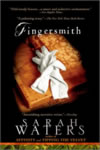Fingersmith
Sue Trinder, a young orphan raised in a den of thieves, sets out from home to embark on a con job that leads her into service, into love, and then into far worse places than The Borough.
Sarah Waters gets the language and tone of 1862 wonderfully right; at times, Fingersmith is like reading an oddly mature Dickens, a Dickens who has had a century to adjust to the outrage of the discovery of modern poverty. She's able, too, to address the Victorian fascination for relationships among women without Victorian evasiveness. That was enough for Fingersmith to be short-listed for the Booker and the Orange (2002).
Water's third novel, Fingersmith divides neatly into three acts. In a very real sense, though, the first act contains everything else: act two recapitulates the narrative from the point of view of the pigeon, and act three tells us how it worked out in the end, but neither the second nor the third act surprise or astonish us. The first act brings us one revelation after another -- plot, setting, language, all bright and astonishing. The second and third add some depth and their slow, measured unfolding itself lends a certain high Victorian gravity.
Fingersmith is a very fine, very big novel. Inside it might be found a stunning, beautiful novella, but then — the economy of publishing being what it is — we might never have known about it.
